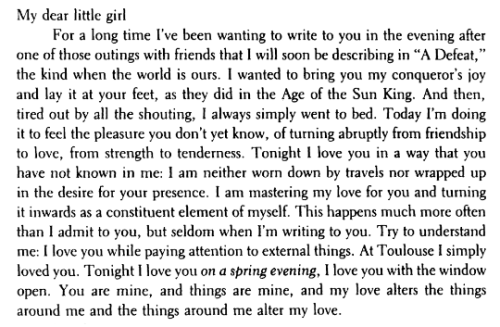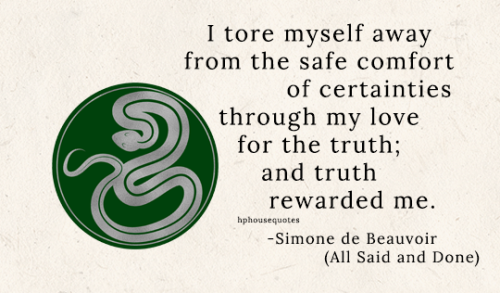#simone de beauvoir
““The female is female by virtue of a certain lack of qualities,” Aristotle said. “We should regard women’s nature as suffering from natural defectiveness.” And Saint Thomas in his turn decreed that woman was an “incomplete man,” an “incidental” being. This is what the Genesis story symbolizes, where Eve appears as if drawn from Adam’s “supernumerary” bone, in Bossuet’s words. Humanity is male, and man defines woman, not in herself, but in relation to himself; she is not considered an autonomous being. “Woman, the relative being,” writes Michelet. Thus Monsieur Benda declares in Le rapport d’Uriel (Uriel’s Report): “A man’s body has meaning by itself, disregarding the body of the woman, whereas the woman’s body seems devoid of meaning without reference to the male. Man thinks himself without woman. Woman does not think herself without man.” And she is nothing other than what man decides; she is thus called “the sex,” meaning that the male sees her essentially as a sexed being; for him she is sex, so she is it in the absolute. She is determined and differentiated in relation to man, while he is not in relation to her; she is the inessential in front of the essential. He is the Subject; he is the Absolute. She is the Other.”
- Simone de Beauvoir, The Second Sex (trans. Constance Borde and Sheila Malovany-Chevallier)
by Simone de Beauvoir
What’s it about?
It’s about women. It’s not an exaggeration to say that The Second Sex invented second-wave feminism.
Oh God. “Feminism”?
No, wait! This book is not like that. It’s a rigorously-researched and deeply intellectual analysis of the place of women in society, both in theory and practice, from the dawn of time to this year (which is this case is 1949). This level of analysis is maintained throughout 978 pages without once descending into triviality or encountering a single sentence that could be described as “man-hating.” Simone de Beauvoir was too busy being awesome and living her authentic life to hate on anyone.
So what does she write about?
The first part is a feminist analysis of history. It’s interesting (because no one had done it before), and introduces the concept of woman’s identity as a function of man’s identity. This situation developed because only women can have babies, but all the real-life womb stuff that goes along with that terrifies men. Allowing women control over their reproductive machinery would therefore go a long way towards freeing women from their merely functional relationship with a society run by, and for, men.
There’s more?
The second part explains in detail how a female child’s future identity as “a woman” is engineered from birth by society’s expectations filtered through the validation of her social network. Things could be different: in a world where women are equal citizens, they should be free to disengage from society’s ideas of femininity, strive to be self-sufficient and forge their own identity (at least insofar as men do). Although, if you’ve read Game of Thrones and you’re struggling with the idea of strong, independent women successfully navigating a world designed for men, you should present yourself to the relevant authorities at first light.
What should I say to make people think I’ve read it?
“Why can’t modern feminists be more like this?”
What should I avoid saying when trying to convince people I’ve read it?
“Wasn’t she the one married to Sartre?” or “Bloody feminists. All the same.”
Should I actually read it?
Definitely. It’s a wonderful antidote for the belief that feminism is dead and contains much which remains relevant to modern audiences.
Simone de Beauvoir, The Second Sex
Simone de Beauvoir, The Woman Destroyed
“En el océano del tiempo era una roca batida por olas siempre nuevas y que no se mueve ni se desgasta. Y repentinamente el flujo me arrastra y me arrastrará hasta que me hunda en la muerte. Mi vida se precipita trágicamente. Y no obstante en este momento se desagota con qué lentitud —hora a hora, minuto a minuto—.”
Simone de Beauvoir. La mujer Rota.
“Cuando me desperté a la mañana, dormía encogido, la mano apoyada en la pared. Aparté la vista. Ningún impulso hacia él. Mi corazón estaba helado y sombrío como una capilla en desuso en el cual no alumbra la más mínima llamita. Las pantuflas, la pipa ya no me conmovían; no evocaban a un ausente querido; no eran más que una prolongación de este extranjero que vivía bajo el mismo techo que yo. Atroz contradicción de la cólera nacida del amor y que mata el amor.”
-Simone De Beauvoir. La mujer rota.
“No comprendía, sentía un peso en el corazón y mi tristeza se extendía como una mancha de aceite; ensombrecía el mundo que, para compensar, la alimentaba.”
-Simone De Beauvoir. La mujer rota.

Horas de lectura ❤
“Quedé desamparada. La tristeza, uno puede llorarla. Pero la impaciencia de la alegría no es fácil de conjurar.”
-Simone De Beauvoir. La mujer rota.
“There is but one truly serious philosophical problem and that is blowjobs.” - Camus. Probably.
Source:Existencial Comics
Post link
SLYTHERIN: “I tore myself away from the safe comfort of certainties through my love for the truth; and truth rewarded me.” –Simone de Beauvoir (All Said and Done)
Post link
❌Ascension is political ❌
107 aniversario del nacimiento de Simone De Beauvoir
Una de las escritoras y feministas más importantes e influyentes del s.XX. Siembre comprometida con sus propios ideales luchó por ellos toda su vida, así como también por la libertad de la mujer y sus derechos
Feliz cumpleaños!
Post link
Interview with Simone De Beauvoir where she discusses street harassment as a form of oppression:
“It’s rare for a man to understand a woman’s experience, what she goes through since he hasn’t experienced it. Even little things: for example the streets belong to everyone. But in fact, for a young woman, it doesn’t matter if she’s pretty or ugly, walking down the street can be an ordeal after 8 or 9 at night or even during the day. Men will follow her, bother her, to such an extent that she’ll prefer to go home. If you tell a man that, he’ll smile, act surprised, say "I don’t do that,” or “I’m not a boor, not all men are boors.” He doesn’t realize what a weight it is for a woman to always feel like she’s in danger, not violent danger, although it can go that far. When a woman rebuffs a man who is following her, she may get slapped or punched.“
До свидания, иду отправлять письмо. В этом тонком конвертике столько любви, что самолет может не выдержать и рухнуть под ее тяжестью.









